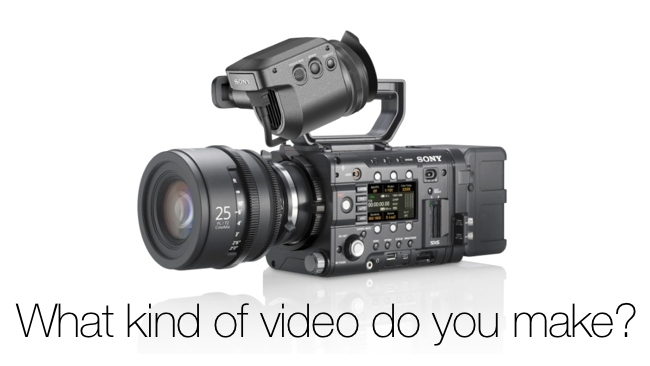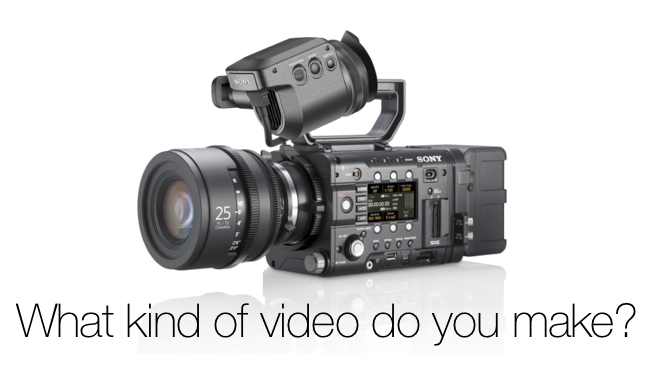
 Sony F5 camera
Sony F5 camera
How do you sell yourself to clients? Is it by talking about your skills or your equipment?
It is a question that often crops up when we are asked what we do for a living. The reality is that most of us video guys can turn our heads to any sort of production if asked, but how many of us truly can define the type of video that we make? Recently I was taking a look through a few competitors websites, and it struck me that quite often, despite corporate video producers often being touted as video marketing experts, many video production company websites were downright awful. Yes, I know my own could do with some work, but in many cases the word awful really does have to be used to describe what I saw.
Blunt opinion
That type of blunt opinion is bound to go down like a lead balloon in some quarters. After all who is this opinionated upstart to use a well known public forum to be able to criticise others? However bear with me for a moment. Some of the sites that I visited didn't have any examples of videos, and one of them even made the website viewer contact the company in order to see them! That's right, a video production company who either doesn't display their work, or who makes you jump through hoops to see it. Madness.
Increasingly there seems to be a gulf between what we tell people we do, and how we actually do it. How can a video production company advise a client on the use of video, particularly on the web, if they aren't even taking advantage of it properly themselves? I digress. More importantly for the purposes of this piece, how many video production companies have given any thought to their style of production?
I have written in the past about how video should serve the purposes of what it is trying to achieve rather than the other way around. On the surface it might seem to suggest that I am recommending a very bare bones approach. After all, a website that is merely functional would be very dull to look at, and the same goes for video. In reality the visuals could be as basic or as complicated as you like. The fundamentally key thing is that your intended audience understands your message, and is hopefully influenced by it, but underlying that potential outcome is the fact that your video needs to be engaging in order to achieve this.
Generic corporate video
Many video producers out there in RedShark reader land will be familiar with the "Generic Corporate Video". You know, the one that has the cheesy and predictable "Getting Ahead" style music, a neutral accented, but overly bassy voiceover, Powerpoint style graphics, usually with a blue theme, and a very serious man in a suit talking a lot of jargon at the viewer. About as inspiring as those highly irritating Halifax adverts that portrayed business suited workers from the banking sector trying to be hip with their own radio station or singing. It is the kind of video that makes you want to punch the screen. Or the faces of the people who are in it. This possibly isn't the sort of reaction that you will desire should you be trying to engage the attention of your audience or endear them to your video.
This is the type of corporate video that many video production companies produce, yet at the same time they claim that they don't! I lost count of the number of production companies who claimed on their websites that they did not produce generic, boring corporate video, but then went on to show just that very thing in their examples! Many businesses are a conservative lot and in order to ensure business as usual it is often tempting to resist rocking the boat, even if we know full well that there is a much better and more interesting way of presenting the message or product. Quite often business executives will want to ensure their firm input into how a video looks. So some companies are a victim of the mentality of "the client always knows best".
They don't. No, really they don't. Educating them, in a nice way of course, should be part of your service. Open up the options for them. Remember they are not video experts and may not be aware of how many different ways there are to skin a cat. They are paying you for your production expertise, not just to hold and point a camera in the right direction.
One website I viewed stated that if a viewer said that the video was great then the production had failed because the viewer should have been stating how good the product was, or commenting on the message of the piece. I agree with the sentiment of that statement, but in reality it doesn't fully add up. Why?
A great video gets spread around
A great video gets spread around, which builds company, message, and product awareness. If somebody orders a product or uses a company's services because of a video they presented then it matters not whether they did so because they enjoyed the video or whether they liked the product. A case in point is when a video advertising campaign goes viral as a result of the video being very funny, very clever, or even controversial. In the end attention was drawn to that product or company even though the video may not have even shown anything directly related to them. I am simplifying things here of course because there's a whole marketing cycle to think about too, which will determine how things work, or don't work. The main point I am driving at is that things are not black and white.
If a viewer enjoys the video then they are more than likely to have listened to and understood the message more than a video that bored them half to death, even if the product was really good. If you are doing things well then you will have produced an enjoyable video as well as one that delivers an effective message. The two qualities are not mutually exclusive.
Film a powerpoint?
How many times has a company come to you and asked you to film a Powerpoint presentation so that it can be shown to employees who missed it? Powerpoint presentations are a sure fire way to induce suicidal tendencies even when they are watched live, let alone as a video recording. Even the companies themselves often admit that they hate them. Can we not, as communication specialists, devise a more interesting way for them to get that information across to their employees? Or are we doomed to a life of laziness where we blindly keep going along to film such drudgery?
I have gone off on a bit of a tangent here, but how does this all relate to the type of video that you make? How many of you have a specialism or a house style? What really distinguishes you from the pack? Is it the way you deal with your clients? Or do you have a unique way of presenting and delivering messages through video? Are you Mr or Mrs Generic, or do you offer truly individual tailoring to each project you approach? Only you can answer this.
Plenty of companies will tell you via their websites that they know what does and doesn't work, and that they are experts at delivering engaging video, but how many of them are simply producing what everyone else does, and how many are really, truly, producing truly individual videos?
From a brief look around the web the answer is not many. The unfortunate result of prices being driven down is that they have often come down to the point where no budget is afforded for creativity and individualism. I can understand and empathise fully with this having been in a similar situation myself many times. If prices are driven down to the point where all that we can ever produce are bog standard nondescript videos that have no real thought behind them, then where does that leave us?
Well, for one thing the few who do rise above this are quids in. This can already be seen in some regard with the ever constant destruction of the medium budget video. These days there is an increasing gulf between those who spend their lives undercutting the competition on price, and those who value themselves and their skills enough to charge what they are worth and who rise above mediocrity. As I alluded to earlier this is of course easier said than done, but nobody could hold it against you for trying.
In conclusion we owe it to ourselves to really think hard about how we approach video production, and how we can deliver clearer and more effective messages, even if arriving at those solutions may take a bit of effort.
Tags: Production



Comments